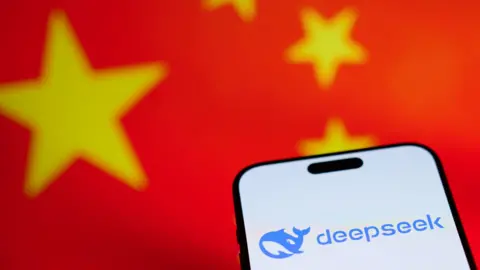
DeepSeek, a Chinese artificial intelligence (AI) startup, made headlines worldwide after it topped app download charts and caused US tech stocks to sink.
In January, it released its latest model, DeepSeek R1, which it said rivalled technology developed by ChatGPT-maker OpenAI in its capabilities, while costing far less to create.
Its popularity and potential rattled investors, wiping billions of dollars off the market value of chip giant Nvidia – and called into question whether American firms would dominate the booming artificial intelligence (AI) market, as many assumed they would.
President Donald Trump described it as a “wake-up call” for US companies.
What is artificial intelligence?
To understand why DeepSeek has made such a stir, it helps to start with AI and its capability to make a computer seem like a person.
A machine uses the technology to learn and solve problems, typically by being trained on massive amounts of information and recognising patterns.
The end result is software that can have conversations like a person or predict people’s shopping habits.
In recent years, it has become best known as the tech behind chatbots such as ChatGPT – and DeepSeek – also known as generative AI.
These programs again learn from huge swathes of data, including online text and images, to be able to make new content.
But these tools can also create falsehoods and often repeat the biases contained within their training data.
Millions of people use tools such as ChatGPT to help them with everyday tasks like writing emails, summarising text, and answering questions – and others even use them to help with basic coding and studying.
DeepSeek: The Chinese AI app that has the world talking
2 days agoShareSave
Kelly Ng, Brandon Drenon, Tom Gerken and Marc Cieslak

DeepSeek, a Chinese artificial intelligence (AI) startup, made headlines worldwide after it topped app download charts and caused US tech stocks to sink.
In January, it released its latest model, DeepSeek R1, which it said rivalled technology developed by ChatGPT-maker OpenAI in its capabilities, while costing far less to create.
Its popularity and potential rattled investors, wiping billions of dollars off the market value of chip giant Nvidia – and called into question whether American firms would dominate the booming artificial intelligence (AI) market, as many assumed they would.
President Donald Trump described it as a “wake-up call” for US companies”
deepSeek has made such a stir, it helps to start with AI and its capability to make a computer seem like a person.
A machine uses the technology to learn and solve problems, typically by being trained on massive amounts of information and recognising patterns.
The end result is software that can have conversations like a person or predict people’s shopping habits.
In recent years, it has become best known as the tech behind chatbots such as ChatGPT – and DeepSeek – also known as generative AI.
These programs again learn from huge swathes of data, including online text and images, to be able to make new content.
But these tools can also create falsehoods and often repeat the biases contained within their training data.
Millions of people use tools such as ChatGPT to help them with everyday tasks like writing emails, summarising text, and answering questions – and others even use them to help with basic coding and studying.


